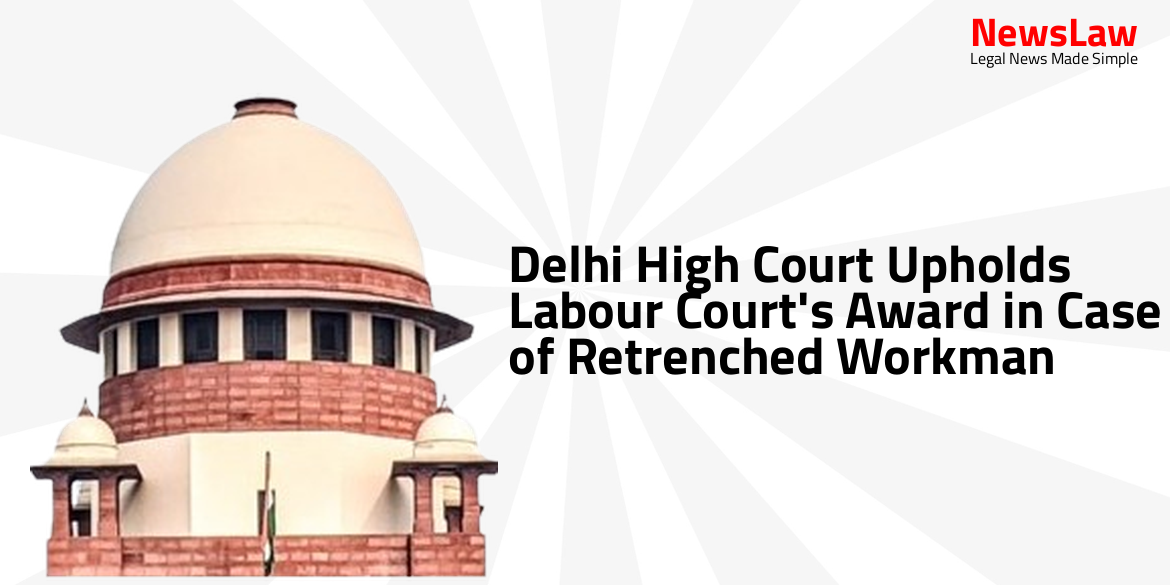In a recent ruling, the Delhi High Court has upheld the Labour Court’s award in the case of the retrenched workman. The Court found in favor of the workman, directing the management to pay compensation as per the Labour Court’s decision. This judgment carries significant implications for labour rights and fair compensation in similar cases.
Facts
- The Labour Court failed to appreciate that the workman has consistently received the salary prescribed for unskilled work without objection during his employment.
- The Labour Court failed to acknowledge that the Industrial Tribunal’s designation did not categorize the workman as skilled based on the minimum rates of wages schedule.
- Contrary to the management’s argument, the workman’s designation as a ‘Packer’ did not align with the skilled designation in the wage schedule.
- The workman did not challenge his designated status during his employment with the management, receiving payment as an unskilled worker.
- The Labour Court erroneously involved unrelated judgments, misunderstanding their relevance to the present case.
- The absence of urgency from both parties to seek a stay following the initial filing of the Writ Petition suggests the lack of immediate concern regarding the impugned Award.
- The retrenchment compensation provided to the respondent workman was deemed inadequate and therefore, the retrenchment was considered illegal.
- The Labour Court determined that since reinstatement was not a feasible option due to imminent closure of the management, the workman was entitled to wages equivalent to the skilled/semi-skilled category, which had not been paid by the management.
- The Labour Court ruled in favor of the respondent workman, directing the petitioner entity to pay a lump-sum compensation of Rs.200,000 within one month of the award’s publication, with the possibility of additional interest at 9% per annum until the amount was fulfilled.
- The Labour Court was criticized for awarding a meager amount of relief of Rs.200,000 plus interest, without considering the skilled and semi-skilled workers’ wages as designated by POIT on 29.09.2009.
- The question of back wages from the award date to the Court dated 12.05.2008 was left for the High Court to decide during the final resolution of the writ petitions.
- Management’s inclusion of the period from the date of transfer to the date of rejoining in the calculation of retrenchment compensation was deemed unjustified, especially considering the illegal transfer of the claimant as declared by POIT and subsequently stayed by the High Court of Delhi.
- Sections 9A and 25-N of the Act were deemed inapplicable to the case by the Labour Court.
Issue
- The issues framed for adjudication are related to the termination of services of the workman and entitlement to compensation.
- The first issue questions the correctness of the Labour Court’s decision regarding the termination of services as per Section 25F of the Act.
- The second issue concerns the reliance on a stayed award of the Industrial Tribunal by the Labour Court for determining compensation.
- The central question before the Court is whether the Labour Court’s award should be interfered with under Article 226 of the Constitution of India.
Arguments
- The award dated 29 September, 2009 was in operation at the time of the illegal retrenchment of the workman on 5 May, 2010.
- The petitioner argues that the judgments cited by the Labour Court are not applicable to the current case, as the facts are different.
- The workman was willing to work but was kept away without a valid reason.
- The petitioner’s plea to decide the matter after a certain writ petition was not considered by the Labour Court.
- The stay order from November 2013 in the designation matter was not taken into account by the Labour Court.
- The petitioner claims that the workman was never designated as skilled and received unskilled wages without objection during his time of service.
- The petitioner asserts that the impugned award is legal and passed in accordance with established legal principles.
- The petitioner believes that the Labour Court should not reconsider the evidence and material on record as no illegality or perversity has been shown.
- The petitioner alleges that the workman is being punished for union activities and raising grievances.
- The petitioner argues that any pending amounts due to disputes should be paid once resolved.
- Ld. ARM argued that granting designation to the claimant has been stayed by the correct calculation of retrenchment compensation and notice pay based on last drawn wages, not the award dated 29.09.2009.
- The award from 29.09.2009 was not challenged by the claimant before any forum, making it final and operating as res-judicata.
- The claimant had filed a case against his transfer, where it was determined by POIT that he was doing unskilled work.
Analysis
- The learned Labour Court rightly awarded compensation based on the designation of the workmen.
- The seniority list was displayed on the notice board and sent to the Labour Department.
- All 22 workers had filed a designation case before POIT which was decided in their favor in 2009.
- Management proved surplus services of the claimant at the time of retrenchment.
- POIT observed that workers were entitled to designations they claimed and were skilled or semi-skilled workers.
- The management erred in not calculating notice pay and compensation as per the 2009 award.
- Section 25-N of the Act did not apply in this case as there were not 100 workmen employed on average per day.
- The consumption of retrenchment compensation was inadequate as it was calculated based on unskilled wages instead of skilled/semi-skilled wages.
- The impugned award was passed during the pendency of the designation matter, but the stay came later, thus the compensation should have been based on the awarded designation.
- The workman failed to produce evidence contrary to the seniority list provided by the management.
- The workman was entitled to compensation based on being a skilled/semi-skilled worker as per the Industrial Tribunal’s decision in 2009.
- The Court discussed the effect of stay on adjudications and laws.
- The Court cited various judgments to explain the impact of stay on legal proceedings.
- It highlighted the duty of the Court to restore parties to their original position post-dismissal of a stay
- Cases like Shree Chamundi Mopeds Ltd v. Church of South India Trust Assn. were referred to support the stance on stay effects.
- Distinction between repeal and suspension of laws was clearly explained.
- The principle of restitution and payment of compensation in cases of closure of management were emphasized.
- The Court discussed the obligation to pay owed compensation even in cases of financial difficulties of the management.
- Legal maxims regarding court actions and their impacts were referred to in the explanation.
- Various Supreme Court cases were mentioned to support the Court’s stand on the impact of stay orders on legal proceedings.
- The duty of the Court to restore parties to their original position was reiterated.
- Section 25-F of the Act lays down the condition precedent to the retrenchment of a workman.
- Sub-section (a) of the said provision requires the employer to give one month’s notice in writing indicating the reasons for retrenchment or pay wages in lieu of such notice.
- Learned Labour Court found that the management illegally retrenched workmen without proper compensation.
- The retrenched workmen were not compensated as per their designation.
- The petitioner management failed to provide any valid arguments in their favor.
- The Court concludes that there is no merit in the petitions and upholds the findings of the Labour Court.
Decision
- The petitioner management is directed to pay the compensation as awarded by the learned Labour Court to the respective workmen within three months.
- The instant batch of petitions stands dismissed.
- Management to pay Rs.2,00,000/- to the workman within one month from the date of publication of the award.
- Failure to pay within the specified time will attract an interest of 9% per annum from today until realization.
- Parties to bear their own costs.
- Award passed accordingly.
- Copies to be sent to the Govt. of NCT of Delhi for publication of the award.
- File to be consigned to record room.
- Issue before the Labour Court was regarding the legality and justification of the workman’s retrenchment.
- The impugned award in each petition is upheld by the Court.
- Pending applications, if any, stand dismissed.
- Judgment to be uploaded on the website immediately.
Case Title: SAWHNEY RUBBER INDUSTRIES Vs. SH. SHANKAR PASWAN (2024:DHC:4569)
Case Number: W.P.(C)-6066/2020



